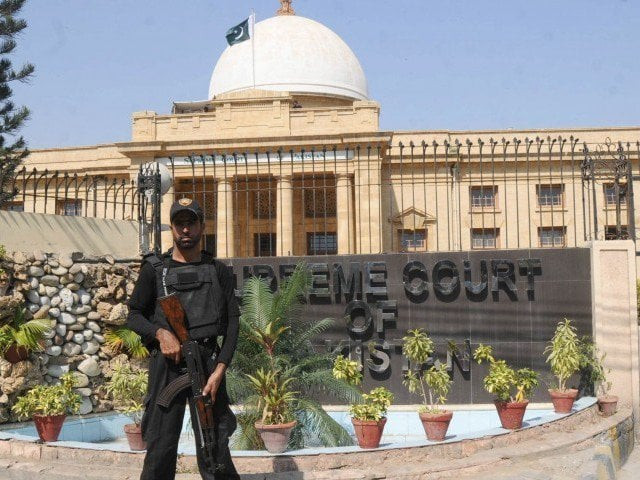K-E, HESCO directed to submit affidavits to Supreme Court
Report sought on inquiry into alleged corruption in Thar Coal project

Supreme Court's Karachi Registry. PHOTO: FILE
The K-E chief distribution officer informed the apex court that efforts were being made to increase power generation. A counsel for K-Electric argued that load-shedding was being carried out because against the demand of 3,500 megawatts (MW), the power utility was producing only 2,950 MW.
K-E was carrying out load-shedding in three categories, the court was informed. It was informed that the duration of the load-shedding varied from locality to locality.
Chief Justice (CJ) Mian Saqib Nisar remarked that it was not power theft but the failure on the part of the power utility that was the cause of the load-shedding. The court sought details of measures that had been taken to upgrade the outdated system.
The CJ observed that power theft was not possible without the connivance of K-E staff. Justice Nisar directed K-E to submit in writing that it would not close its plants from now on. He warned that strict action would be taken if plants were shut.
SC adjourns hearing of case on Islamia Trust's educational institutes
Justice Sajjad Ali Shah, who was on the bench hearing the matter, asked whether there was some fault of the consumers for which they had to suffer from load-shedding.
In a remark during the hearing, the CJ said that after having their loans written-off, people pretended to be so poor as if they could even not afford food for themselves, however, when investigations were conducted against them, they turned out to be owners of BMWs and similar luxurious vehicles.
Directing the power companies to submit the affidavits in a week, the apex court adjourned the hearing.
Thar coal corruption
A larger SC bench also directed the chief secretary to present a detailed report on the inquiry into alleged corruption in Thar Coal project.
During Thursday's proceedings, Advocate-General Zameer Ghumro appeared before the bench, to which the CJ reminded him that professional ethics demanded that he should leave the office as he was a part of the former government's cabinet.
"Even the attorney-general has tendered his resignation," Justice Nisar remarked, adding that Advocate Ghumro should have left the office of advocate-general when the caretaker set-up took over.
Apex court directs NAB to file fresh appeals against acquittals
The apex court directed the chief secretary to present a report on the ongoing inquiry into Thar Coal corruption case and adjourned the hearing.
Missing person case
On a petition regarding a missing person, Khalid Hussain, the SC directed the nominated parties to submit replies.
Hussain's wife kept on weeping during the hearing and eventually fell unconscious. She informed the apex court that her husband was abducted on July 19, 2017 and was still missing.
The CJ assured her that he would personally look into the matter. Replies have been sought from law enforcement agencies and the court will have details about the missing person in two to four days, Justice Nisar said.
Varsity fined
The apex court imposed a fine of Rs20,000 on Jinnah University for not issuing degrees to three female students.
Apex court annuls notification allowing use of luxury cars
The SC directed the varsity administration to immediately issue degrees to the three mass communication students.
In their petition, the students had maintained that in spite of completing the two-year degree programme at the varsity, they were not issued their degrees. They lamented that their time was being wasted as they could not take admission in any other programme without their degrees.
The CJ asked a lawyer representing the varsity about the rule, according to which the varsity had withheld the students' degrees. The lawyer, however, could not satisfy the court, upon which the SC passed the verdict in favour of the students and imposed the fine on the varsity.


















COMMENTS
Comments are moderated and generally will be posted if they are on-topic and not abusive.
For more information, please see our Comments FAQ